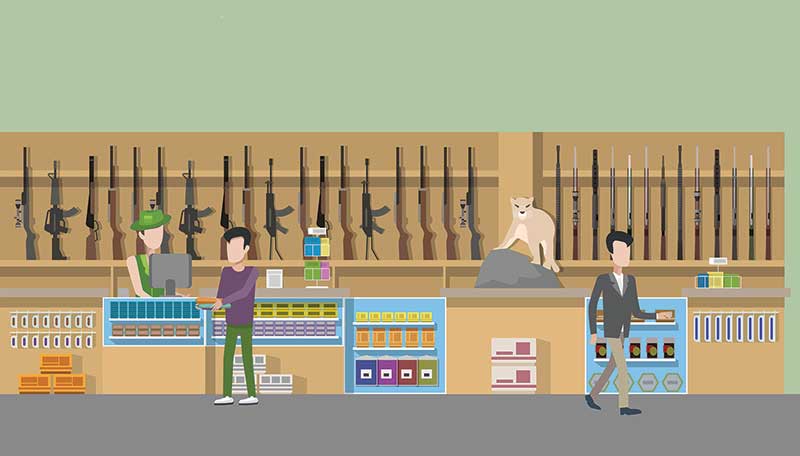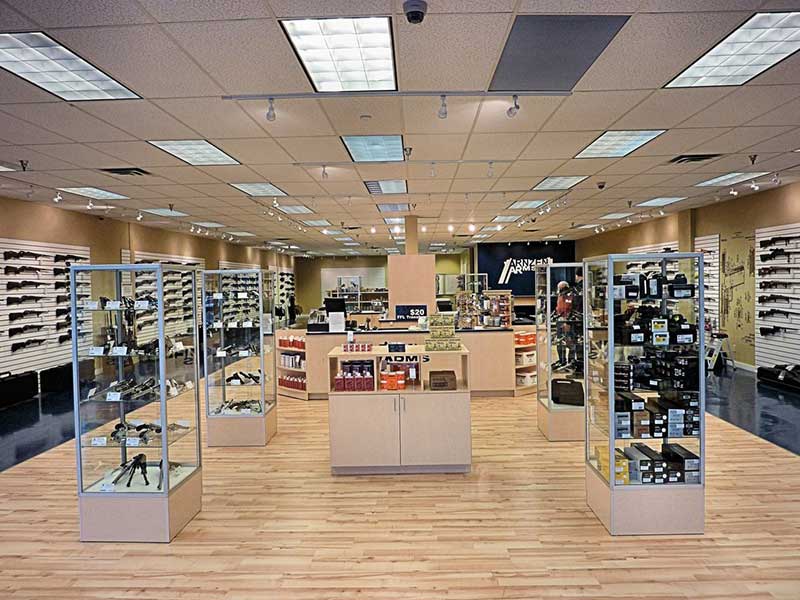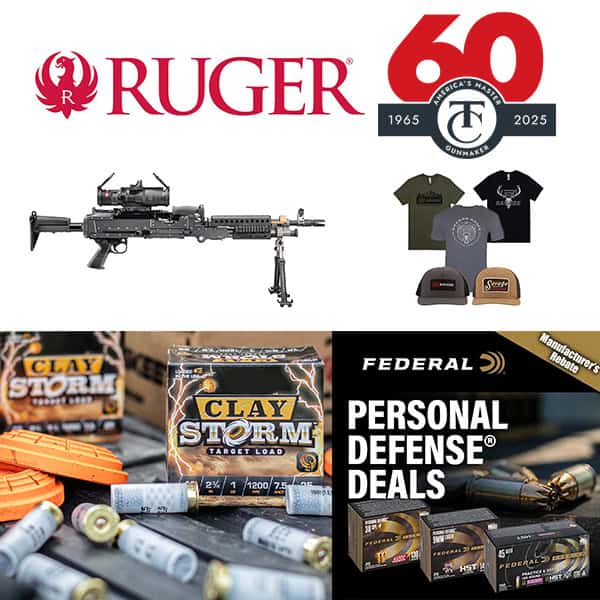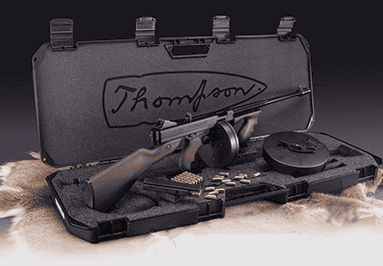Storefronts vs. Non-Storefronts vs. Ranges
I’ve seen the “Home-Based FFLs: Why Are We Pariahs?” articles and would like to add my two cents to this discussion. I’ve been a retailer, joined a buying group for more advantages, worked for a distributor that focused on brick-and-mortar and am now with a manufacturer. (The manufacturer I work for is in indoor range equipment, so I really don’t have dog in the retail fight anymore.)
Not only do I believe storefront retailers deserve first crack at new items, hard-to-get inventory and, most importantly, better pricing than non-storefronts, I feel ranges with retail should get even more benefits. Why? Because they provide a huge asset to both the consumer and our industry. You may not think it’s fair, but if you’re not providing a benefit why would you deserve a reward in the way of better treatment than others who provide a service that benefits the consumer? If you’re only moving product and not providing any service/benefit, you’re probably hurting the industry.
Anyone Can Sell Cars
Here’s a parallel example from the automotive industry. Say I’m a car guy, enjoy keeping up on the newest models, giving friends advice on what I think is best one for them and like Fords. Does this mean I should be allowed to sell new Fords out of my garage, at swap meets or on a website just because I received a license to sell cars? Should I be able to buy them at the same price as my local dealer?
Of course not, I’m not providing a service to Ford or the consumer. I could say my local dealer doesn’t give good pricing or advice to my friends like I would. I could point out he only stocks best sellers and neglects to stock Roush Mustangs. With these points, I doubt my call to Ford Motor Company to sell me cars at the same price as my local Ford dealer would be returned.
Why should firearms be any different? Look at the success Benelli has had — you don’t see non-storefronts offering them. What you do see is stores that have earned the right to be a Benelli dealer with generally good displays and tend to have staff who knows the product.
The Storefront Experience
Imagine a storefront with a gleaming display — this type of presentation helps the image of the brand, dramatically increases the chance for the consumer to have a good experience, learn about the brand (like Benelli), benefits of each model and select the one best suited for the purpose the consumer had in mind. There’s also a good chance the consumer came in thinking they wanted one model, and after talking with a knowledgeable salesperson they were steered to a model, gauge or barrel length better suited to their goal. This interaction adds value to the brand and the consumer and dramatically increases the chances this consumer enjoys our sport and will continue being a consumer.
Providing this type of experience costs a lot of money on behalf of the storefront retailer. Cost of building in a good retail area, extra cost to make the building look good (both inside and outside), having staff on hand to answer questions, cost to have them trained, capital spent to have inventory in stock for consumers to handle and on and on.
If Benelli sold to everyone, what incentive would the retailer have to invest in the extras that make a good experience for the consumer?
The Non-Storefront Experience
Let’s look at how this would work if consumers could buy Benelli from a non-storefront. Our consumer, instead of turning into a well-lit parking lot in a retail area, has to go to someone’s garage — certainly not a high-end brand image. Think they’ll the same high-end displays? Not a chance. Without having access to multiple models, gauges or barrel lengths to swing, odds are pretty good the consumer will end up with the wrong one. Think also about all the extras to help this consumer enjoy the sport — cleaning kits, choke tubes, cases, etc. If the non-storefront doesn’t have them, they could order it for our consumer — but where’s the value in that? The consumer can do the same from their couch.
So, our basement dealer really didn’t provide a value to the consumer, Benelli or the industry. Again, why should this basement dealer be rewarded by getting special pricing, shipments, or other considerations?
The Manufacturer Experience
Now let’s look at it from the manufacturer’s side. If Benelli sold to non-storefronts, at the beginning they would probably sell a lot more guns, as both brick-and-mortar retailers too small to be on the program and non-storefronts would rush to get in on selling Benelli. Not too long after the non-storefronts with low overhead (no expensive rent payments, far less labor cost, no expensive point of sale/inventory management system and of course very little inventory carry cost) will drop the price, racing to the bottom.
For a while Benelli is the beneficiary as they sell even more guns. Next, legitimate dealers start losing sales to the lower-price offered by non-storefronts. The storefronts quickly figure out it’s not worth the effort to stock a lot of Benellis, spend labor dollars training the staff on the finer points of Benelli, and advertise they’re a Master Dealer.
If you’re only moving product and not providing any service/benefit, you’re probably hurting the industry.
Finally, the storefront dealers stop putting in extra inventory, extra training of staff and Benellis just fall into the rest of the stock, no special display as the incentive to promote Benelli would go away, eventually they may just stop stocking them altogether. Years after these storefront dealers stop offering a premium retail experience, consumers lose the image of the brand being high end, finally after the brand is footballed around at low prices, no retailers focus on them.
Now the industry suffers a little because the brand isn’t advertised (any good advertising of our sport is helpful to our health), consumers — especially new ones — don’t have a good buying experience. They didn’t get the extra assistance, selection to choose from and may even have purchased the wrong model for their needs, so now the gun ends up unused in the closet and we lose a lifelong consumer.
Why Ranges Deserve Even More
Take it a step further: If the retailer has a range where the consumer can test drive before they buy, we have a grand slam. Now, it’s very likely they buy the right model for their needs. It’s the best-case scenario for the industry and the consumer.
This is why I campaign ranges deserve even better treatment — not only over non-storefront, but even more than retail-only stores. Range operators have made a huge investment into our sport, offer shooting as entertainment, training opportunities and more to grow the industry. Someone who buys a firearm and actually uses it is exponentially more likely to stay involved in our sport.
Keith Collier, co-owner of Cypress Creek Indoor Range in Florence, Ala., sees this everyday: Consumers come into his range asking about one model and after test-firing leave with another model better suited to their needs. With the benefits Keith’s business provides every day to consumers and manufactures, tell me how he doesn’t deserve first chance at allocated items and better pricing from someone without this huge investment in a range and inventory.
To this end, my favorite promotion involved ranges being treated better than both non-storefronts and standalone retailers. I worked for a now bankrupt distributor and ran a range-only promotion for the launch of the GLOCK Gen5. GLOCK selected certain ranges to launch the gun, by opening at midnight or first thing the next morning.
Each range received 20 GLOCK Gen5s to sell days before any retailers (even big-box stores) received them, and they also got some range guns for consumers to test out.
This allowed ranges to sell the guns without discounting and gave consumers a great experience by allowing them to try before they buy since they knew the range had some in stock. A win for the ranges, huge win for consumers and win for GLOCK.
We Need A Footprint
No, I’m not living in a dream world, I realize there’s a lot that can and does go wrong in the above examples. Too often, brick-and-mortar retailers are their own worst enemy and will race to the bottom on pricing, have untrained staff, not offer a great retail experience, not have the product in stock, etc.
However, if we — as an industry — don’t protect them somehow, will our industry be as strong? If all we become is a giant webpage with products at cheap pricing, no stores left to provide outstanding retail experience, no ranges where consumers can test, train and entertain, what are we then?







